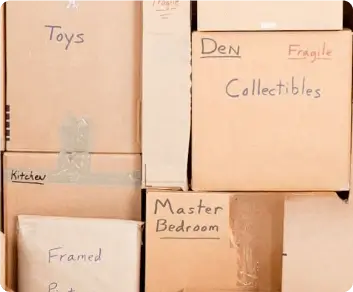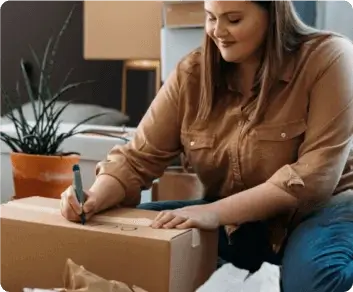How to Label Boxes for Moving?
Have you ever been surrounded by a sea of boxes after moving, unsure of where anything is? Moving can already be stressful, and nothing adds to that stress more than disorganized, unlabeled boxes. Labeling your boxes properly when moving can save you time, effort, and a lot of frustration.
But how exactly should you label your moving boxes? Let’s break it down step by step, so you can unpack like a pro.
Why Labeling Boxes is So Important While Moving?

Imagine this: you’ve just moved into your new home, and you need to quickly find your kitchen essentials to make dinner. Instead, you’re left rifling through random boxes labeled “Miscellaneous.” Not ideal, right? Proper labeling helps you stay organized, find what you need quickly, and makes the entire moving process smoother.
When you label moving boxes correctly, you’re not just organizing your items - you’re also making life easier for movers, or friends and family who are helping. They’ll know exactly where each box should go, reducing the risk of items being misplaced or damaged.
Steps for Labeling Moving Boxes
-
Start by Sorting Your Items
Before you even think about labeling, it’s important to sort your belongings. This will help you understand what’s going into each box and where it needs to go. Group similar items together—for example, pack all your kitchenware in one box, books in another, and bathroom supplies in a third. Sorting items will also give you an idea of how many boxes you’ll need for each room.
Pro Tip: Make sure each box is dedicated to one room or category to avoid confusion later.
-
Gather Labeling Supplies
Next, you’ll need to gather the supplies you’ll use for labeling. Here’s what you’ll need:
1. Permanent markers (preferably in multiple colors)
2. Pre-made labels or blank labels
3. Colored packing tape
4. Box inventory sheet or notebook
Using multiple markers in different colors can make your labeling system even more efficient. You can assign a color to each room or category, making it easy to spot where each box belongs at a glance.
-
Label Clearly and Consistently
The key to labeling is to be as clear and specific as possible. A good rule of thumb is to include these three elements on every box:
1. Room Name
Indicate where the box should go in the new home, such as “Kitchen,” “Living Room,” or “Master Bedroom.”
2. Contents
Write a brief description of what’s inside, like “Pots and Pans” or “Winter Clothes.”
3. Handling Instructions
If the contents are fragile, make sure to write “FRAGILE” in large, bold letters. You can also indicate whether a box should be unpacked first by marking it with “Open First.”
For example, a well-labeled box might say:
Kitchen – Pots and Pans – FRAGILEPro Tip: Label the sides, not just the top, so you can see the label even when the boxes are stacked.
-
Use a Numbering System
If you want to be extra organized, consider numbering your boxes. This can be especially helpful for large moves with many boxes. Assign each box a number and create a corresponding inventory sheet that lists the box number and what’s inside. For example:
1. Box 1
Kitchen – Pots, Pans, and Cooking Utensils
2. Box 2
Living Room – Books and Magazines
This system not only helps you keep track of all your belongings, but it also ensures that nothing gets lost in transit. If a box goes missing, you’ll know exactly what was in it.
-
Color Coded Moving Labels for Quick Identification
![Color Coded Moving Labels for Quick Identification]()
To make things even easier, you can use a color-coding system. Assign a specific color to each room or area in your new home and use colored tape or markers to label the boxes accordingly. For instance, you could use:
1. Red for the kitchen
2. Blue for the bathroom
3. Green for the bedroom
4. Yellow for the living room
This way, you (and your movers) can quickly identify which room a box belongs to just by looking at the color.
-
Include Room and Box Details on All Sides
When you stack boxes in the moving truck or in your new home, only labeling the top can lead to problems. You might not be able to see the label if other boxes are stacked on top. Make sure to write the room name and contents on all sides of the box so that no matter how it’s stacked, you’ll be able to easily identify it.
Pro Tip: Use large, bold handwriting, so it’s easy to read from a distance.
-
Use Labels for Immediate Essentials
Create special labels for boxes containing essentials you’ll need right away after the move. These could include items like toiletries, important documents, chargers, medications, or kitchen basics. Label these boxes as “Open First” so you can easily spot them in the pile of boxes and get what you need without hassle.
Consider packing a separate “first-night” box for each family member with items like pajamas, toiletries, and a change of clothes. Label it clearly so you can find it right away.
-
Make a Master List
Once everything is packed and labeled, it’s a great idea to make a master list of all the boxes and their contents. This list will act as your guide during the unpacking process. If you're feeling tech-savvy, you could even create a digital list on your phone or a spreadsheet, which would allow you to search and update easily.
Having a master list will not only help you during the move, but it will also come in handy if anything goes missing, as you’ll know exactly what was in each box.
Benefit of Proper Labeling
Properly labeling your moving boxes may take a little extra time up front, but it will save you hours of frustration when you reach your new home. Not only will you know exactly where everything is, but the unpacking process will also go much faster. Plus, you’ll reduce the risk of losing or damaging important items.
Advantage of Hiring Moving Company
If you’re feeling overwhelmed by the moving process and don’t have the time or energy to label and organize your belongings, Moving Ally LLC has you covered. We offer full-service moving solutions that handle everything from packing and labeling to loading, transporting, and unpacking.
Whether you're moving across town or across the country, we ensure that every detail is taken care of, so you can focus on what matters most - your work or other important tasks. Our expert team uses an efficient labeling system to categorize your items, ensuring everything is properly organized and easily accessible once it reaches your new home.
We provide an array of services, including furniture moving, long-distance moving, commercial moving, and even last-minute moving. We have tailored packages designed to fit your unique situation and budget. Our top rated local movers work quickly and carefully to ensure a smooth transition to your new location. With local moving services, you can rest assured that your move will be stress-free, organized, and handled with care - giving you peace of mind every step of the way.
Labeling Tips for Different Types of Moves
Residential Moves
If you’re moving to a new home, whether it’s across town or just a few blocks away, labeling is key to a smooth transition. Residential movers often recommend using a combination of color-coded moving labels and detailed content descriptions to make the move as efficient as possible. When working with affordable local movers, clear labels can help prevent miscommunication and ensure that your boxes are placed in the correct rooms.
Apartment Moves
Moving into an apartment requires a slightly different approach. Space is often limited, so organization is crucial. Labeling your boxes by room and content will help you quickly unpack and settle into your new apartment. Apartment movers appreciate clear labeling, as it allows them to efficiently navigate tight spaces and deliver your belongings to the right rooms.
Commercial Moves
For businesses relocating to a new office, proper labeling is essential to minimize downtime. Commercial movers need to know exactly where each item belongs to ensure that your office is up and running as quickly as possible. Label boxes not only with the room or department but also with specific content, such as "IT – computer cables" or "HR – employee files."
With the right labeling system, you’ll be able to settle into your new space with ease, knowing that every box is in the right place and contains what you expect. So, grab those markers, labels, and tape, and start packing like a pro!




